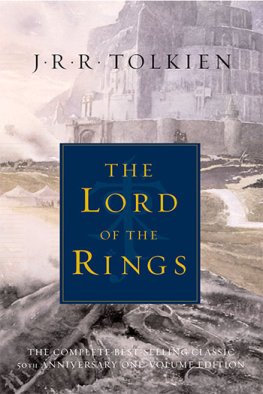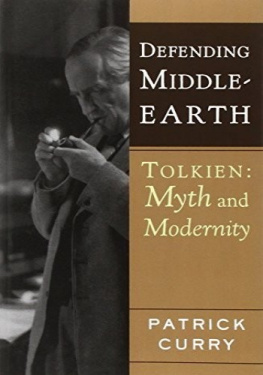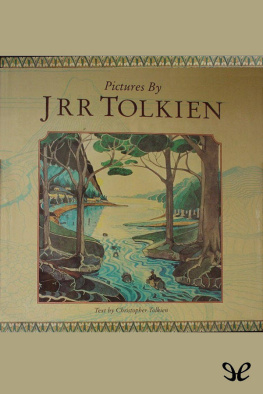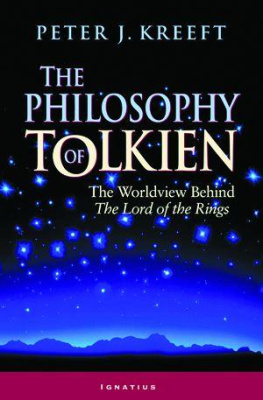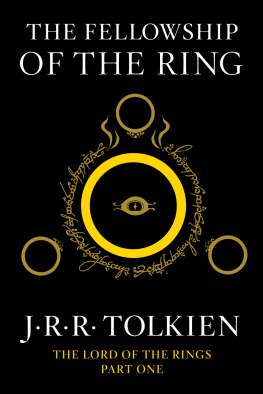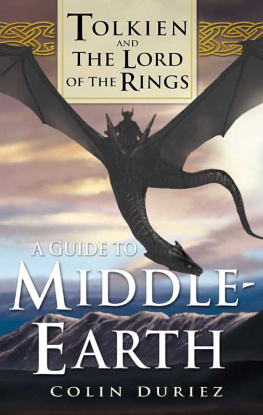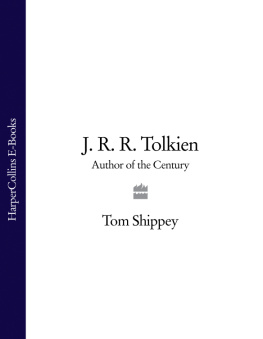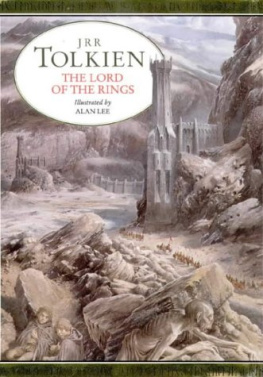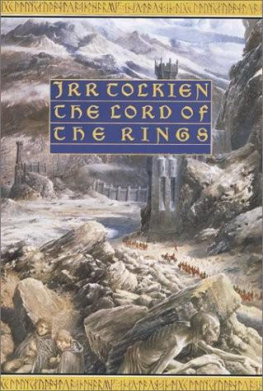Graham McAleer - Tolkien and The Lord of the Rings: A Philosophy of War
Here you can read online Graham McAleer - Tolkien and The Lord of the Rings: A Philosophy of War full text of the book (entire story) in english for free. Download pdf and epub, get meaning, cover and reviews about this ebook. year: 2014, genre: Romance novel. Description of the work, (preface) as well as reviews are available. Best literature library LitArk.com created for fans of good reading and offers a wide selection of genres:
Romance novel
Science fiction
Adventure
Detective
Science
History
Home and family
Prose
Art
Politics
Computer
Non-fiction
Religion
Business
Children
Humor
Choose a favorite category and find really read worthwhile books. Enjoy immersion in the world of imagination, feel the emotions of the characters or learn something new for yourself, make an fascinating discovery.

- Book:Tolkien and The Lord of the Rings: A Philosophy of War
- Author:
- Genre:
- Year:2014
- Rating:4 / 5
- Favourites:Add to favourites
- Your mark:
- 80
- 1
- 2
- 3
- 4
- 5
Tolkien and The Lord of the Rings: A Philosophy of War: summary, description and annotation
We offer to read an annotation, description, summary or preface (depends on what the author of the book "Tolkien and The Lord of the Rings: A Philosophy of War" wrote himself). If you haven't found the necessary information about the book — write in the comments, we will try to find it.
Tolkien and The Lord of the Rings: A Philosophy of War — read online for free the complete book (whole text) full work
Below is the text of the book, divided by pages. System saving the place of the last page read, allows you to conveniently read the book "Tolkien and The Lord of the Rings: A Philosophy of War" online for free, without having to search again every time where you left off. Put a bookmark, and you can go to the page where you finished reading at any time.
Font size:
Interval:
Bookmark:
Tolkien and the Lord of the Rings : Philosophy of War
By Graham McAleer
Table of Contents
Copyright 2014 by Graham McAleer
All rights reserved. No part of this publication may be reproduced, distributed, or transmitted in any form or by any means, including photocopying, recording, or other electronic or mechanical methods, without the prior written permission of the publisher, except in the case of brief quotations embodied in critical reviews and certain other noncommercial uses permitted by copyright law.
Preface
There are an estimated 2 million war gamers that use The Lord of the Rings models and motifs for their games. This book is for all interested in Tolkien but I hope gamers might especially enjoy its ideas. It is a work of philosophy but I hope it adds depth to imaginative play, as well as provoking thought about the moral and political considerations underwriting war: themes Tolkien connected with war, like land, place, property, possession, plunder, justice, mercy, peace, courage, and loyalty.
Throughout I point to many passages in L OTR, The Hobbit, and The Silmarillion, as well as scenes in the Peter Jackson films. I also step back to explore the moral, legal, and political ideas, which structure Middle-earth, its characters, and drama. LOTR is a work of fantasy but it is also a proposal about civilization, therefore a work about the moral standing of privilege and equality, property ownership and its distribution, reason and emotion, the moral coherence of our commercial civilization, and what is inextricably linked with all of these, war. My own proposal is that Tolkien believed that the way we think about war is also the way we think about civilization, about who we are, who we should be.
Tolkiens son and editor, Christopher Tolkien, speaks of h is fathers dislike of modern things. For Tolkien, the modern age was the age of the machine and it can be resolved, I think, into two themes: vanity and primitivism.
In the pages below, I show that LOTR is a dissent from who you and I are. We might huff and we might puff about our cultural condition but it remains true that we are the creatures of a revolution in thought and sensibility crafted by the great eighteenth century philosophers David Hume and Adam Smith. Of course, they were not alone, but it was especially these two Scottish Whigs who explained the benefits of a commercial civilization. Put briefly, these Whigs argued that trade and industry are better than knights and priests; that the former replacing the latter would enable us to live longer, in better conditions, and so make us happier. They thought that vanity drives commerce, the allure of refined complex systems. Every time you graze your hand across your iPad, even if it is to find your HBO app to watch Game of Thrones, you concede the Whig point. Tolkien regrets this, and proposes instead a reconnecting with what was lost in the Whig revolution. However, and this is my main point, to reconnect with what was lost is not to return to the Middle Ages nor a lurch left towards the barricades and the revolutionary aspirations of `68.
Studies abound in which Tolkiens thought is related back to the Middle Ages, but I think Tolkien is best understood as one of a group of modern conservative Catholic thinkers who offer an alternative social philosophy to that of the Whigs. Their alternative, and one recent formulation of it has been dubbed Red Tory, is a proposal about land, property, law, the sacred, morals, and war. I want to show that Tolkien offers a distinctively modern Catholic theory of war.
It is easy to think of Tolkien as a fabulist, a man living in a make-believe world because he had abandoned his own. I do not think this is right. The remarkable continuity between his ideas and his Catholic contemporaries shows, I am sure, that he was part of a reaction to cultural transformations that he disapproved of morally and politically. He is an ally of well-known writers like G. K. Chesterton and Evelyn Waugh and, what I want to show, and ally of philosophers like Max Scheler, Carl Schmitt, and Aurel Kolnai. The ideas of war, morals, and politics discussed here are principally concepts shared by philosophers alive when Tolkien wrote. Of course, some use is made of ideas from Tolkiens beloved Middle Ages but, as I will show, Tolkien was very much a man of his time. Like all great artists, he was gifted with, and burdened by, remarkable intuitions about human beings and their longings, but he was also a great man for ideas and there were many striking formulations floating in the air around him.
In every community , the great themes of war, friendship, mercy, treachery, possession, land, tyranny, and evil, are the stuff of fascination. How did Tolkien refine his own sense of these themes? This book defends the claim that Tolkien believed war stems from an attachment to land, the boundaries of which depend on a sacred love, and express a civilization. In turn, he thought civilization inseparable from grace, privilege, distinction, hierarchy, a vigorous moral order, and a retributive attitude willing to defend these things.
The Whigs misstated these themes but the modern age poses another threat: the return to primitivism. When it was decided that LOTR should appear as three volumes a tussle between Tolkien and his publisher broke out. A sticking point was the title of the third volume, The Return of the King . Though Tolkien considered dedicating LOTR to Queen Elizabeth II, this is the title set by the publisher, not Tolkien. He preferred The War of the Ring . Both titles are intimately connected. War, thinks Tolkien, is sometimes necessary to preserve civilization. Though monarchy is not identical with civilization every monarchy does help craft civilization. Kolnai speaks of the timeless moral order which genuine Conservative statecraft recognizes as the irremovable measure of its designs and acts (PL, 115). Monarchy alerts us to this timeless moral order because it introduces ideas of hierarchy, gradation, difference, status, honors, style, manners, law, and transcendence. That is, monarchy alerts us to an order of diverse values, sometimes shared, sometimes not. Around these various value clusters discrete social institutions develop. The Enemy in LOTR is primitivism. The forces of Sauron and Saruman are masses of orcs: crude, ill-spoken, simplistic cannibals. They represent the true hopes of Sauron and Saruman, to exercise power unreservedly over a docile mass society, undifferentiated, lacking style, manners, and status. And hobbits as miserable slaves would please him far more than hobbits happy and free. There is such a thing as malice and revenge (FR, 48). Gandalf says these words to Frodo about the Dark Power. They are ably applied to a feature of the modern age, totalitarian movements.
A special thanks to the students who participated in my L OTR undergraduate classes, spring 2006 and 2009, as well the graduate class, autumn 2011. The discussions were exceptional, and I much appreciated the corrections when I misstated or did not grasp the nuances of the lore of Middle-earth! A hearty thanks to all of you.
I want to thank the Catholic Studies Programme of Loyola University, as well as the graduate Liberal Studies Programme, under whose auspices the courses ran, and to acknowledge their financial support.
Thanks also to all those over the years who joined the luncheon discussions offered by the Committee on Catholic Social Thought at Loyola University. Although we did not talk about Tolkien we read and spoke much about what is of apiece with his thinking.
Thanks generally then to Loyola University for a most supportive environment in which to teach and research. Special thanks to many good friends associated with Loyola: Gary Backhus, John Betz, Steve Weber, Brain Murray, Eric Wilson, Nadja German, Alex Rosenthal, Paul Seaton, and Fr. John Peck, S. J..
Next pageFont size:
Interval:
Bookmark:
Similar books «Tolkien and The Lord of the Rings: A Philosophy of War»
Look at similar books to Tolkien and The Lord of the Rings: A Philosophy of War. We have selected literature similar in name and meaning in the hope of providing readers with more options to find new, interesting, not yet read works.
Discussion, reviews of the book Tolkien and The Lord of the Rings: A Philosophy of War and just readers' own opinions. Leave your comments, write what you think about the work, its meaning or the main characters. Specify what exactly you liked and what you didn't like, and why you think so.

